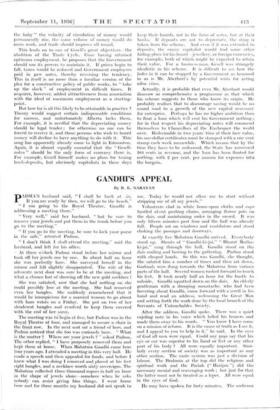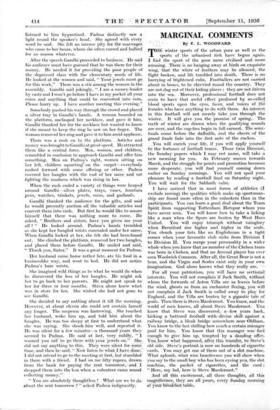GANDHI'S APPEAL
By R. K. NARAYAN
pADMA'S husband said, "I shall be back at :;ix. If you are ready by then, we will go to the beach." " I am going to the Royal Theatre. Gandhi is addressing a meeting there."
" Very well," said her husband, " but be sure to remove your jewels and put them in the trunk before you go to the meeting."
" If you go to the meeting, be sure to lock your purse in the safe," retorted Padma. • " I don't think I shall attend the meeting," said the husband, and left for his office.
• At three o'clock Padma stood before her mirror and took off her jewels one by one. In about half an hour she was perfectly bare. She surveyed herself in the mirror and felt slightly disappointed. The wife of the adVocate next door was sure to be at the meeting, and what a chance lost of showing off the new gold necklace !
She was satisfied, now that she had nothing on she could possibly lose at the meeting. She had removed even her bangles. She suddenly remembered that it would be inauspicious for a married woman to go about with bare wrists on a Friday. She put on two of her slenderest bangles and resolved to 'keep them covered with the end of her saree.
• The meeting was to-Begin at five, but Padma was in the Royal Theatre at four, and managed to secure a chair in the front row. In the next seat sat a friend of hers, and Tadrna noticed that she too was curiously bare. " What is the matter ? Where are your. jewels ? " asked Padma. The other replied, " I have purposely removed them and kept theni at home. When Mahatma Gandhi came here four Years ago, I attended a meeting in this very hall. He made a speech and then appealed for funds, and before I knew what I was doing I removed and placed at his feet eight bangles, and a necklace worth sixty.sovereigns. The Mahatma collected three thousand rupees in half an hour in the shape of jewels alone—somehow when he asks nobody can resist giving him things. I ,went home bare and for three months my husband did not speak to me. Today he would not allow me to start without stripping me of all my. jewels."
- Volunteers clad in white home-spun cloths and caps bustled about pushing chairs, arranging flower pots on the dais, and maintaining order in the crowd. It was only fifteen minutes past four and the hall was already full. People sat on windows and ventilators and stood choking the passages and doorways.
' At exactly five Mahatma Gandhi arrived. Everybody stood up. Shouts of " Gandhi-ki-jai," " Bharat Matha- ki-jai," rang through the hall. Gandhi stood on the dais smiling and bowing to the gathering. Padma stood with clasped hands. So this was Gandhi, she thought. She saluted him a number of times and then sat down. Garlands were flung towards the Mahatma from various parts of the hall. Several women rushed forward to touch his feet. It took nearly half an hour for the bustle to . subside. Gandhi squatted -down on the dais. An'elderly gentleman with a drooping moustache, who had been hovering about Gandhi, came forward with a scroll in his hand and read an address, welcoming the Great Man and setting forth the work done by the local branch of the Servants of Untouchables Society.
After the address, Gandhi spoke. There was a quiet cajoling note in his voice which lulled his hearers and made them sway to his words. " You know I have come on a mission of reform. It is the cause of truth as I sec it, and I appeal to you to help in it," he said. In the eyes of God all men were equal. Could any 11 say that his eye or ear was superior to his Band or feet or any other part of his body ? All were equally important. Simi- larly_ every section of society was as important as any other, section. The caste system was just a division of labour. The Brahmin at the top did the religious and spiritual work and the Pariah (" Harijan ") did the necessary menial and scavenging work ; but just far that the latter must not be treated as a leper. All were equal • . . in the eyes of god.
He may have spoken for forty minutes. The audience listened to him hypnotised. Padma distinctly saw a light round the speaker's head. She agreed with every word he said. She felt an intense pity tor Abe Scavenger: who came to her house, whom she often cursed and bullied for no reason whatever.
After the speech Gandhi proceeded to business. He said his audience must have guessed that he was there for their money. He needed it for providing the poor people of the depressed class with the elementary needs of life. He looked at the women and said, " Your jewels must go , for this work." There was a stir among the women in the assembly. Gandhi said jokingly, " I am a money-lender by caste and I won't go before I have in my pocket all your coins and anything that could be converted' into coin. Please hurry up: I have another meeting this- evening.".
Somebody pushed his way through the crowd and placed a_ silver tray in Gandhi's hands. A woman bounded on the platform, unclasped her necklace, and gave it him. Gandhi thanked her for the necklace but wanted to know if she. meant to keep the ring he saw on her finger. The woman removed her ring and gave it to him amid applause.
There was a rush on to the platform. Articles and money was brought to Gandhi at great speed. He attracted them like a central force. Men, women, and children, scrambled in confusion to approach Gandhi and offer him something. Men on Padma's right, women sitting on her left, children squatting- on the carpet—everybody rushed forward with some offering or other. Padma covered her bangles with the end of her saree and sat fighting the madness which was rising in her.
When the rush ended a variety of things were heaped around Gandhi—silver plates, trays, vases, fountain pens, watches, trinkets, jewels, coins, and garlands.
Gandhi thanked the audience for the gifts, and said he -would presently auction all the valuable articles and convert them into cash. But first he would like to assure himself that there was nothing more to come. He asked, " Brothers and sisters, have you given me your all ? " He looked around. Padma's hands trembled as she kept her bangled wrists concealed under her saree. When Gandhi looked at her, she felt she had been found out. She climbed the platform, removed her two bangles, and placed them before Gandhi. He smiled and said, " Thank you, Sister." It was a great moment for Padma.
Her husband came home rather late, ate his food in a businesslike way, and went to bed. He did not notice Padma's bare wrists.
She imagined wild things as to what he would do when he discovered the loss of her bangles. He might ask her to go back to her parents. He might not speak to her for three or four months. Shiva alone knew what was in store for her. She wished she had not gone to see Gandhi.
She decided to say nothing about it till the morning. However, at about eleven she could not contain herself any longer. The suspense was harrowing. She touched her husband, woke him up, and told him about the bangles. He was too sleepy at first to understand what she was saying. She shook him well, and repeated it. He was silent for a few minutes—a thousand years they seemed to Paclma. He said at last, very mildly, " I warned you not to go there with your jewels on." She, d an id not say ything to this. They were silent for some time, and then he said, " Now listen to what,I have done. I did not intend to go to the meeting at first, but stumbled in there -with a friend. I had on me fifty rupees, drawn from the bank for paying the rent tomorrow, and I dropped them into the box when a volunteer came round collecting money."
" You are absolutely thoughtless ! What are we to do ' about the rent tomorrow ? " asked Padma indignantly.













































 Previous page
Previous page